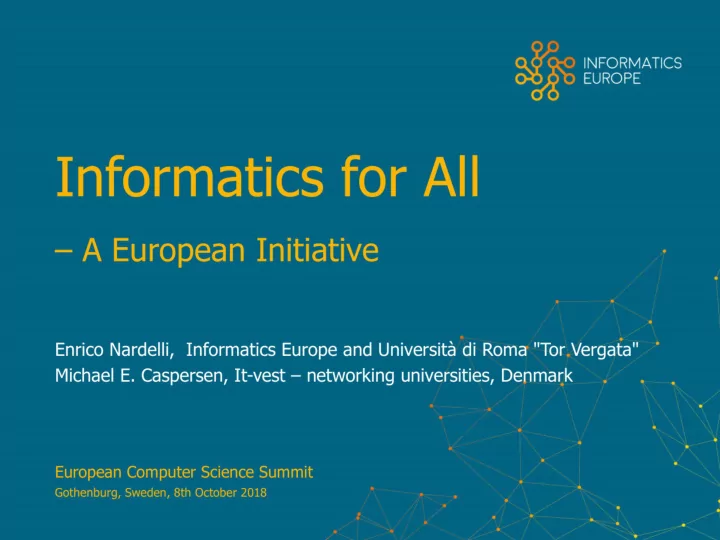

Agenda • Informatics for All: The Strategy – Background – Content – Recommendations • Discussion – Content & Recommendations – Political action & Communication action • Why this? – We need your help! – How can we help bring this forward in various countries? – How can we establish political (inter-)action with national ministries? – What can we do together/individually? – Recruitment of members to WG on Informatics Education – Interface between K-12 and university (entrance requirements)
Joint ACM-E and IE White Paper (2018)
CECE Report (2017)
Digital Competences in the 21 st Century Knowledge area Informatics In subjects As subject Advanced As radical, novel, and defining ('for some', ‘for career’, in-depth) technology and way of working Fundamental (innovation of subjects) ('for all', ‘for life’, general ‘bildung’) Specialisation Integration (as subject / study programme) (in subjects / study programmes) Subject-specific Technological, practical, As subject-specific tool/media pedagogical, and subject-specific Pedagogical Support E-learning and collaborative tools Practical Digital literacy (”ECDL”) – literate consumer of IT Technological Technology and infrastructure
2013 Udbredelse 2014 2015 2016 In the new economy, CS is not an optional skill, it is a basic skill, right along with the three R's https://www.whitehouse.gov/the-press-office/2016/01/30/weekly-address-giving-every-student-opportunity-learn-through-computer
Informatics New aspect of 'bildung' New basic competence for all ... German Technology Music Design Art Informatics Geography Economy Social science English Psychology Geology Marketing Biology Literature Spanish Chemistry History Physics Classical history Chinese Biotechnology Reading Writing Informatics Mathematics Mathematics is (primarily) the language of science Informatics is (becoming) a language of all subjects
CS for All Informatics for All Informatics for All A similar joint effort by a coalition of the major informatics organisations in Europe
Informatics for All Group Chair Wendy Hall ACM Europe Judith Gal-Ezer Andrew McGettrick Informatics Europe Enrico Nardelli Michael E. Caspersen CEPIS Bob McLaughlin Austeja Trinkunaite Advisor Bobby Schnabel
Two-tier strategy: Informatics - as subject (specialisation) - in all subjects (integration) [ at all educational levels ]
Specialisation Current change in public perception of Informatics: "a useful tool and infrastructure to facilitate numerical, administrative and industrial processes" "ubiquitous and a driver of innovation and development in all fields (professions, school subjects and research areas)"
Integration Like professions and scientific fields, all school subjects are gradually transformed because of Informatics. Through digital models, subjects can be learned in novel and more engaging ways, computational approaches will open doors to new dimensions of understanding and expression and radical new ways of learning subjects.
Recommendations R1: All students must have access to ongoing education in Informatics, preferably from primary school... Curriculum R2: Informatics curricula should reflect the scientific and constructive nature of the discipline... R3: Informatics courses must be compulsory and at least on a par with courses in STEM disciplines... R4: All teachers at all levels should be digitally literate... Teachers R5: Informatics teachers should have appropriate formal education... R6: Higher education institutions should provide encouraging programs... R7: Ministries should [...] establish national or regional centers for PD... Research R8: Intensive research of three different facets, curriculum, teaching methods and tools, and teaching the teachers is needed to successfully introduce Informatics into the school system
Informatics on a par with courses in STEM disciplines Informatics at least on a par with courses in STEM disciplines [ Informatics on a par with Mathematics ]
Two Challenges for our Community To clarify and set direction (outward) To deliver (inward)
Our Grand Educational Challenge Expansion of Informatics (think math) Educational Integration Specialisation level (in subjects/programmes) (as subject/programme) Higher Secondary New type of research group? Informatics Education Research Primary Curriculum ♦ Teachers (food chain) ♦ Research
W i d e r r o l e of Informatics in universities Research Study programmes Working Session on Wednesday afternoon
Keynote @ ECSS 2015 Shifting Identity in Computing: From a Useful Tool to a New Method and Theory of Science
The Fourth Scientific Domain Technical, natural and health science Nature can be understood – measured and weighted Study and manipulation of nature Humanities Study of humankinds cultural products and languages Social sciences Study of society and organisations Informatics/Computing The world (the real and the imaginary) is computable Study and construction of (prototypes for) computationelle structures, processes, artefacts and systems Rich relations to and implications for the three classical scientific domains
Computational X, for X = Education Economics Psychology Chemistry History (Molecular) Biology Linguistics Physics Archeology Musicology Ethnography Theology Literature Law Journalism Social Science ...
Computational skills in all study programmes, e.g.: 1. Problem framing From wicked to tamed problems 2. Data and data processes Collect, create, analyse, manipulate, transform and visualise data 3. Modelling and simulation Design, construct and evaluate computational models 4. Computational problem solving Algorithmic thinking, programming, computational abstractions 5. Systems thinking Understand, describe and define complex systems in terms of phenomena and their relations
Next steps Wider role of Informatics in Universities Research and study programmes Working Session on Wednesday afternoon PISA (OECD) Mathematics: Computational Thinking (a hook) Sciences: Physical, Life, Earth and Space, Digital An event in Brussels (early 2019) Representatives from EU, industry, academia, teacher organisations, ...
Discussion • Content & Recommendations – Curriculum – Teacher Education – Informatics Education Research – Two-tier strategy at all educational levels • Political action and communication actions – National level – European level • We need your help! – How can we help bring this forward in various countries? – How can we establish political (inter-)action with national ministries? – What can we do together/individually? – Recruitment of members to WG on Informatics Education – Interface between K-12 and university (entrance requirements)
Recommend
More recommend